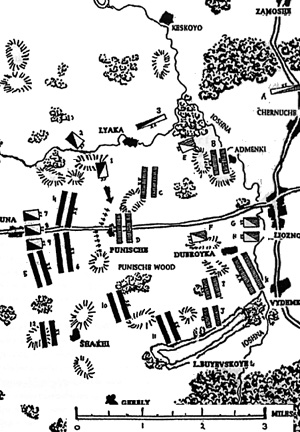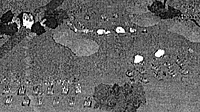 The Crisis of the Day
The Crisis of the Day
The Russian III Corps surged forward again to the attack. Holding back Konovinitzin, Tutchkow led with Strogonoff's 1st Grenadier Division, supported on their right by Tchoglokov. Using all of 96 guns in one enormous battery, Tutchkow pounded the village of Punische and Oudinot's rapidly thinning divisions for an hour before sending Strogonoff against them. Unfortunately for the Russians, in their excitement to get to grips, two mistakes were made. First, the 1st Cavalry Division, intended to support the attack South of Punische, failed to coordinate with the infantry and assaulted Legrand alone. While they overthrew several battalions and forced the battered formation to retire behind Merle's 9th Division, Oudinot was able to steady Merle's fresh troops before Strogonoff arrived. Bringing them out of square as the Russian horse recalled, the Marshal had just enough time to prepare them to receive the attack of the grenadiers.
Secondly, when Strogonoff did advance the grenadiers spread out to assault all along Oudinot's line, both North and South of the blazing Punische, instead of concentrating their efforts on just one sector. Russian staff work was inadequate, and Strogonoff found himself at odds with both of Oudinot's front line divisions. Either one, attacked separately, would have been overrun in minutes, but together they were able to hold- just. The 8th Division (ex-Maison's) lost it's second commander of the day, felled by a Russian bullet, and the French began to give ground. Once more, though, Oudinot was there to seize command. The Marshal was everywhere, rallying battalions, directing batteries and leading counterattacks. Somehow, when the Russians fell back, he was still standing- albeit sporting a light wound. This was an amazing display of "leading from the front". Even the enemy were impressed: "I must commend General Oudinot for his outstanding courage...Several times I saw him in the front lines, appearing to hold together his wavering formations by his sheer magnetism, and he unhesitatingly exposed himself to the most severe bombardments it has been my privilege to witness." (Barclay de Tolly, Official Memoirs) The Russian chief was less generous to his own subordinates: "If the normally gallant General Tutchkow had displayed similar heroics, one wonders what sort of result might have been obtained." (ibid) As for Oudinot, he was just glad to still have troops under command: "Again we had escaped what could have been a devastating blow from the Russians." (Memoirs of Marshal Oudinot)
Strogonoff had beaten Oudinot back, but he had not pierced him. Legrand had fallen back on Una and Montbrun's cavalry, while Merle's and (the late) Maison's divisions had given up the village of Punische and retired 1000 yards to the West. All Strogonoff had to show for his pains was possession of a pile of burning rubble. The attack had failed. In typical Russian style, the 3rd Cavalry Division, sent by Barclay to a position from which to support Tutchkow's assault from the right, stood by and watched. Without direct orders to support the attack, their commander merely awaited further instructions- instructions which never came. History has not recorded who's error this was- should Barclay have been more specific?
did Tutchkow just forget them in the heat of the moment? (No record has survived of Barclay informing Tutchkow that the 3rd Cavalry Division was to operate under his orders)
should the divisional commander have exercised his initiative ? (not likely in a Russian army!) Whatever the reason, after the 1st Cavalry Division "shot its bolt", Strogonoff was left to go forward without cavalry support, allowing Oudinot's 8th and 9th Divisions to meet him in line and hold him- forced into square by close cavalry support, they would have been swept from the field by the grenadiers. But the opportunity was lost.
 The absence of cavalry support had a second, devastating effect. With their supporting troops (Strogonoff) committed to the attack, Tutchkow's guns lay silent, while Tchoglokov's 11th Division stood to their right. The 3rd Cavalry Division, still waiting for orders, were 1000 yards to the rear of the gun line. Suddenly, over a crest a few hundred yards to the North of Tchoglokov, there emerged the cuirassiers of Nansouty's corps. Having stood in place since arriving on the field at 7 a.m., the general was not about to let this opportunity pass.
The absence of cavalry support had a second, devastating effect. With their supporting troops (Strogonoff) committed to the attack, Tutchkow's guns lay silent, while Tchoglokov's 11th Division stood to their right. The 3rd Cavalry Division, still waiting for orders, were 1000 yards to the rear of the gun line. Suddenly, over a crest a few hundred yards to the North of Tchoglokov, there emerged the cuirassiers of Nansouty's corps. Having stood in place since arriving on the field at 7 a.m., the general was not about to let this opportunity pass.
Caught in flank, the infantry had no time to form square and the division panicked and fled in the direction of their own cavalry. Abandoned by the infantry, the entire gun line was ridden down, gunners sabred and train destroyed before Nansouty gave the signal to recall. At a stroke, one quarter of the Russian artillery was removed from the battle (though all were later recovered). Without artillery, Tutchkow's forces could not prosecute another attack, and Oudinot had won yet more time for himself and his Emperor. (It actually took five hours for the reserve artillery to be brought forward to replace the abandoned grand battery!)
The French infantry, heartened by these events, attempted a counterattack into Punische. The 8th Division, under its third leader of the day, contacted Strogonoff, but the 9th Division was unable to support them and the effort was repulsed. In fact, Merle's failure to support the attack was not of his making-- one of Montbrun's divisions had tried to push forward to support Nansouty, and had become horribly interpenetrated with the French infantry. It took some time to sort out this mess, by which point the attack was already over. The French commanders were reminded that, while they were enjoying the lion's share of good fortune, not everything was going their way! It was early afternoon, and still no sign of reinforcements.
The Battle of Liozno: Background
The Battle of Liozno: Initial Dispositions
The Battle of Liozno: Opening Gambit
The Battle of Liozno: Meanwhile, to the South...
The Battle of Liozno: The Crisis of the Day
The Battle of Liozno: Decision Time
The Battle of Liozno: Order of Battle
Back to Empire, Eagles, & Lions Table of Contents Vol. 3 No. 1
© Copyright 1996 by Jean Lochet
This article appears in MagWeb (Magazine Web) on the Internet World Wide Web.
Other military history articles and gaming articles are available at http://www.magweb.com
